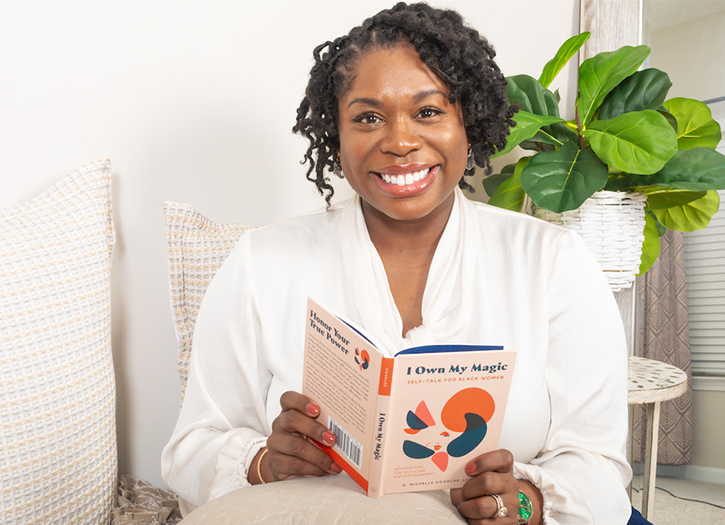If you’re ever in a funk or need a pick-me-up, self-help books might be your best bet (of course, therapy is great too!). While there’s a multitude of best-selling self-help books out there, from The Alchemist to The Secret to The Four Agreements, it’s even more refreshing to find a book dedicated to the Black woman, giving her the power and confidence to step into her greatest potential.
Introducing G. Michelle Goodloe and her newest book titled I Own My Magic: Self-Talk for Black Women: Affirmations for Self-Care and Empowerment. This guided journal is jam-packed with affirmations, helping you discover your true power and all the magic that comes with it. Inside you will find self-care practices that help you live life to the fullest, while discovering your inner strengths and applying them into real life situations.
I Own My Magic is a celebration of the Black female identity, and Goodloe makes it a point to empower women all around the world, challenging them to live as their most authentic self. This book will invite you to lay your burdens and hardships down to rest, while uplifting you and giving you tips and resources to feel seen.
Sheen Magazine spoke with G. Michelle Goodloe, LCSW, to discuss her background, the new book, the importance in self-care, standout excerpts from the book, and being a new mom!
Where are you from originally and how’d you get your start in all this?
Hey there! I was born in Atlanta, Georgia and raised in Indianapolis, Indiana. I’ve always loved helping others and in my senior year as an undergraduate at Indiana University Bloomington, I learned through a professor that I could pursue a career in social work. From there, I pursued and earned my Masters in Social Work from Loyola University Chicago, concentrating in Children and Families. My education in social work, my direct service experiences, and clinical trainings to earn and maintain my licensure have had a magnificent impact on where I am today.
Tell us about the book, when did you first get the idea?
I’ve been writing bits and pieces of I Own My Magic: Self Talk for Black Women for years. I have always thought about my own care as a Black woman and how that looks different than mainstream society’s idea of self-care. When the opportunity presented itself to create a published work, centered on the self-care of Black women, I couldn’t say yes fast enough!

What is self-talk and how is it different from self-care?
I break this down in the first chapter of I Own My Magic: “Self-talk is the encouragement and support you communicate to yourself and with yourself. While you will find excerpts, information, and ideas to help you practice self-care, this journal supports you in creating your own encouraging ways to connect to how you take care of yourself.
Self-care is the practice of routinely identifying and addressing what you need to show up as your favorite version of yourself. Self-care is a combination of habits, practices, rituals, and routines that you put energy into to take care of yourself the best way you know how.”
(Page 16 | I Own My Magic: Self Talk for Black Women)
Why is self-care not selfish?
In the first chapter of I Own My Magic, I share that: “Taking care of your needs does not mean you do not care for others. Caring for yourself can actually help strengthen your capacity to care for others and put energy into what’s important to you. Practicing self-care and knowing your self-worth are all about getting grounded and affirmed in loving who you are and setting boundaries around how you can preserve this self-love.”
(Page 22 | I Own My Magic: Self Talk for Black Women)
How can women hang up the superhero cape by creating, setting, and maintaining their boundaries?
Boundaries make so many of us uncomfortable! So many Black women feel afraid, hesitant and avoidant when it comes to boundary-setting and maintenance. Not to mention the soft and hard consequences that can come with saying no as a Black woman in today’s world.
Why is it difficult for women to set and maintain boundaries as well as ways to begin setting stronger boundaries?
I take a close look at this in the third chapter of I Own My Magic:
“Many Black women are taught that prioritizing your needs is an act rooted in being uncaring of others. Many people from Black communities and other communities of color view self-care for women as not caring for your family, being neglectful of your loved ones, not living up to your womanly duties, and selfishly focusing on yourself. This was the message that I learned. And this message carried weight into my young adult life. There are social, generational, gender-based, and cultural implications that tie selfishness and practicing self-care together.”
(Page 21 | I Own My Magic: Self Talk for Black Women)

How can one discover and appreciate their worth?
“Valuing yourself means identifying your own needs and recognizing that you are important. Self-worth through practicing self-care is acknowledging your own needs and creating time, space, and energy to take care of those needs. Appreciating your self-worth includes understanding that there is space for you to take care of yourself well. It is difficult to discover and appreciate your worth if you are distracted and pressured to please others. Self-worth has to do with how you feel about yourself.”
(Page 21-22 | I Own My Magic: Self Talk for Black Women)
Learning to appreciate yourself is important because your relationship with yourself is the relationship that needs the most care. It is important to recognize and reflect on the parts of yourself that you love, because you are in a relationship with yourself for the long haul.
What are the steps to take care of your needs?
The first step is getting to truly know yourself by practicing self-reflection. My favorite way to self-reflect is through journaling. My recommendation for beginners is to find a guided journal or a guided meditation that prompts you with questions to self-discover. My first self-published work, Self Explore, Self Restore, was created for this very reason. It is a guided journal that has a different journaling prompt on every page to help the reader get to know themselves better.
Any information and ideas to help you practice self-talk?
Practice makes progress! Practice learning when you are speaking negatively to yourself and try your best to interrupt that narrative with compassion, patience, kindness and curiosity as often as you can.
What else are you excited for this year?
I’m so excited to see my little boy grow up! I’m a new mom to an amazing 5-month-old. Watching him grow up gives me all the joy!







Add Comment
You must be logged in to post a comment.